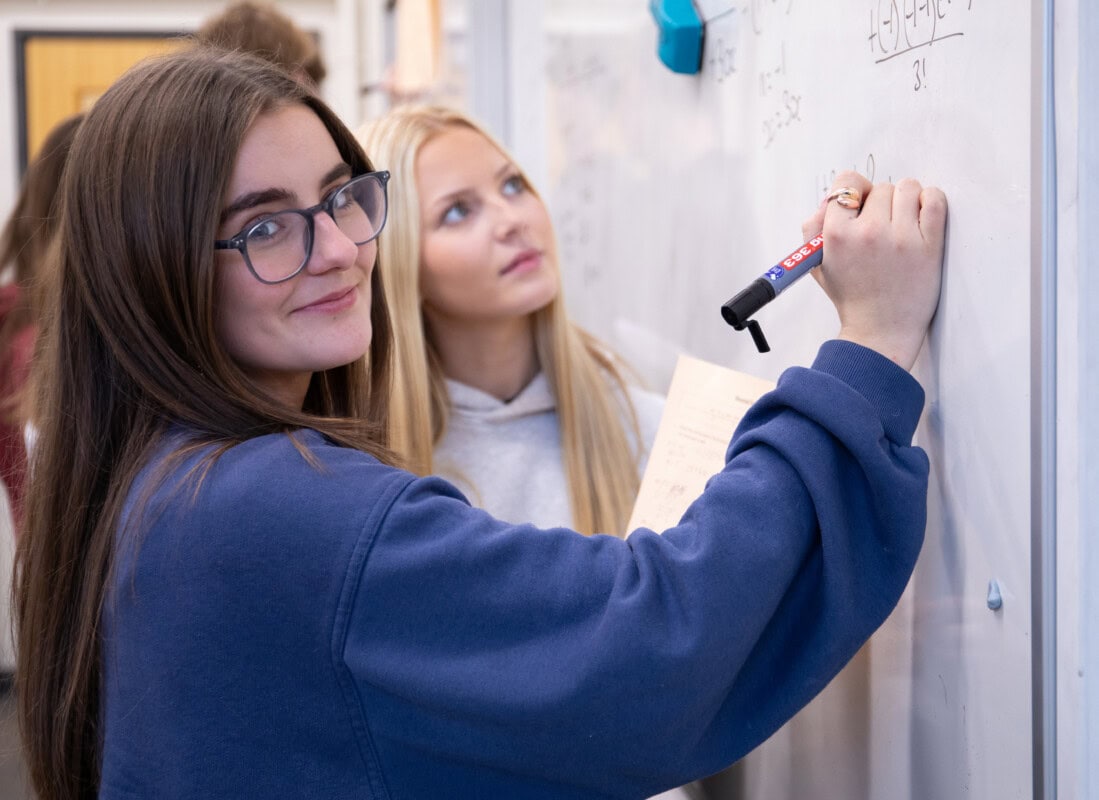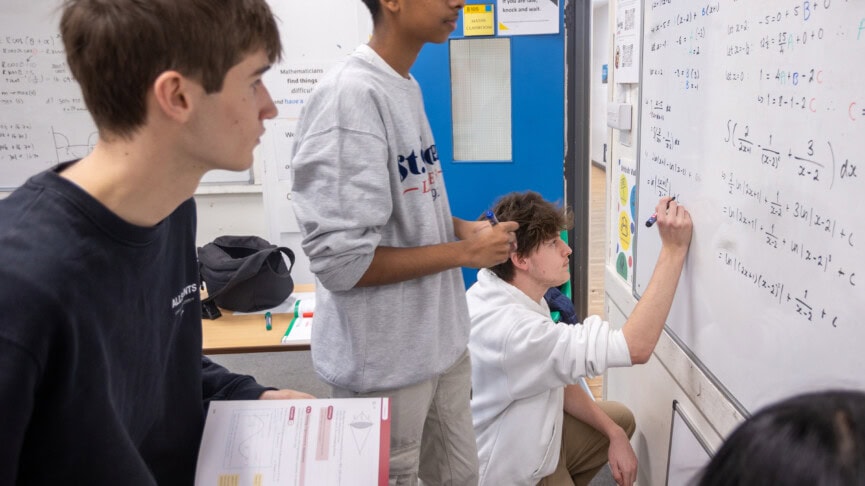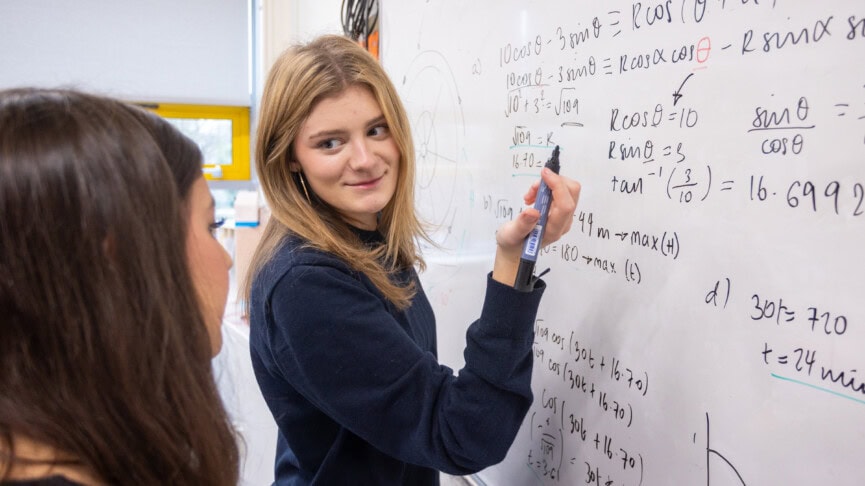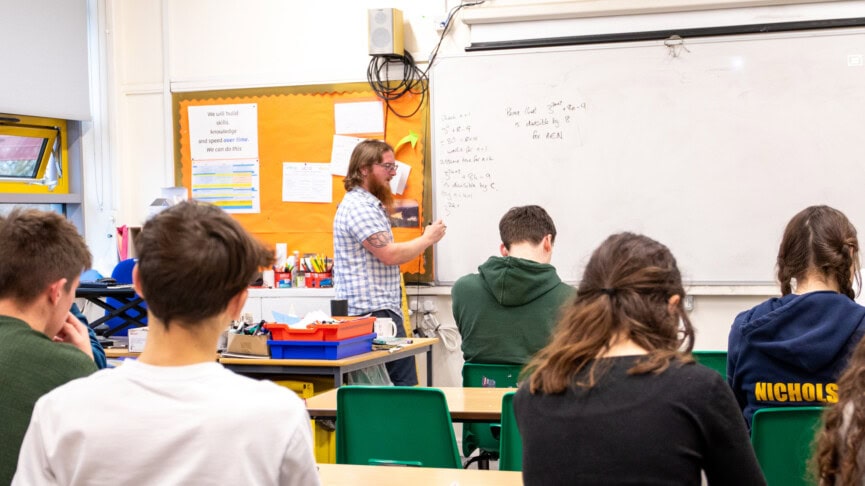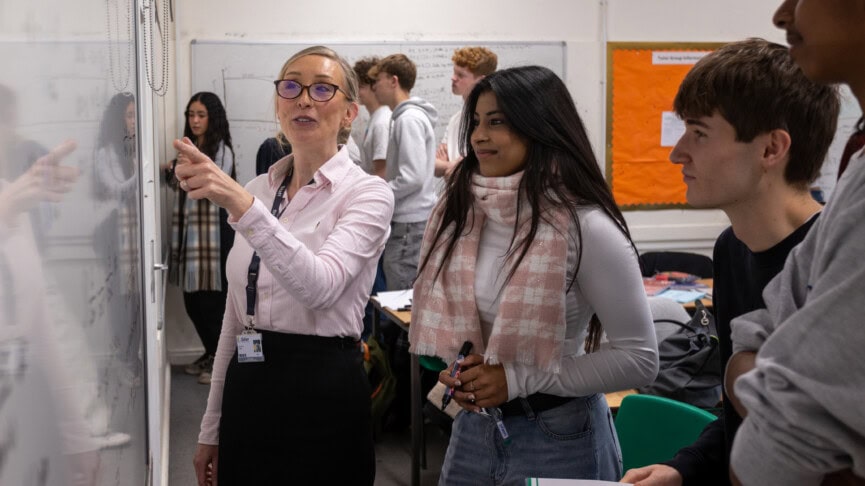Overview
Further Mathematics A Level consists of a broad range of topics in Pure Maths, Mechanics and Statistics.
It is taken in addition to Mathematics A Level and only as part of a four A Level study programme. The pace is fast, and topics are covered in more depth than in the single Mathematics A Level.
Pure Maths is the study of mathematical ideas and methods for their own sake and to give a ‘toolkit’ for solving mathematical problems. All Pure Maths is expressed in terms of algebra. Most of the course is Pure Maths but in addition to this you will study Statistics and Mechanics.
Statistics involves learning how to draw conclusions from data. It is very different from Statistics at GCSE and focuses on probability. Mechanics involves using Mathematics to describe the motion of objects and how they respond to forces acting on them – from cars in the street to satellites revolving round a planet. It includes topics such as energy and collisions.
Entry Requirements
In addition to the College Entry Requirements, to qualify for this course you will also need to achieve a minimum of:
- Grade 8 in GCSE Maths.
A Level Further Maths must be taken as one of 4 A Levels.
Course Details
The qualification is both deeper and broader than the single, Mathematics A Level, which covers Pure Maths with some Statistics and Mechanics. As well as covering all the material for Mathematics A Level, the Further Mathematics A Level core content introduces additional topics.
The additional topics in Pure Maths include:
- Imaginary numbers – How negative numbers can have square roots and what the consequences are. This is the basis of chaos theory and is unexpectedly useful in electrical engineering.
- Maclaurin’s Series – The Maths behind how values of sin, cos and tan are found.
- Linear Algebra – The Maths behind how a computer can solve 102 simultaneous equations in 102 unknowns as easily as you can solve 2 equations in 2 unknowns.
- Second order differential equations – The Maths behind why bridges can wobble dangerously if people walk across them at a critical speed.
The additional topics in Mechanics include:
- The mathematics behind bungee jumping.
- The mathematics of collisions, such as in snooker.
The additional work in Statistics and Probability includes among other things, looking at the Maths behind how casinos ensure they almost always make a profit (and gamblers almost always make a loss!).
Assessment
Further Mathematics is assessed through four written exam papers at the end of the second year.
Note that this is in addition to the three written exam papers for your Mathematics A Level, which you will also sit at the end of the second year.
Subject Combinations
You can pair Mathematics and Further Mathematics, with almost any combination of subjects. If you meet the criteria to take four A Levels, you can take two other A Levels alongside Mathematics and Further Mathematics
Common subject combinations include Physics, Chemistry, Computer Science, Biology, and Economics.
University Destinations
Further Mathematics A Level is a highly respected qualification, with 94% of our students progressing onto University.
Here are some typical university destinations that our Further Mathematics students go on to.
Click on a destination to see some examples of courses they have taken;
Careers
Mathematics with Further Mathematics gives the strongest possible background for Maths-based careers in a range of industries including Physics, Engineering, Computer Programming and Academia.
Further Maths is needed only for Mathematics degrees at a small number of the most competitive universities. It is also more or less necessary for Physics, Engineering and Computer Science (and highly desirable for Chemistry too) at a couple of the most competitive universities. However, outside of this, Mathematics A Level is sufficient for all Maths based courses, including Maths itself.
FAQs
What are the benefits of taking Further Maths?
- You go deeper into the theory of Maths.
- You learn the material in a more challenging and deeper way.
- You work alongside other good mathematicians.
- You develop greater maturity as a mathematician because you have more experience of solving problems and thinking mathematically.
- Doing Further Maths can help you clinch a grade A in your A Level Maths.
- If you have already studied maths beyond GCSE, then taking Maths with Further Maths means you get onto new ideas more quickly than on the A Level Maths courses.
What enrichment activities are on offer?
There is the opportunity to take part in the United Kingdom Maths Trust’s Senior Maths Challenge and to take part in team-based Maths competitions locally. We also give support from teachers experienced in the field for students needing to take additional tests (such as the Mathematics Admissions Test (MAT) for the University of Oxford and Sixth Term Examination Paper (STEP) used by the University of Cambridge).
In the final week of your first year, the College holds its Wider Skills Week, which is dedicated to enrichment activities. The Mathematics department offers students the chance to explore cryptography and codebreaking, with a visit to Bletchley Park.
What support is there at Esher?
There are lots of things we can do to help you if you are struggling. Remember we are a department of highly experienced A Level teachers, all with a strong maths background, so we can offer you an excellent level of teaching and tuition.
We also run daily Maths clinics, every lunchtime. The purpose of these is to provide a place for students to discuss problems with homework and get some individual help.
There is a maths club once a week where students tackle interesting problems which are not on the A Level syllabus.
How big are the classes?
Class sizes vary between 14- 22 students. We have a high proportion of female students taking Further Maths. Students who take Further Maths are taught in the same group for all eight of their weekly maths lessons.
Can you take Further Mathematics without Mathematics A Level?
No, you can’t. You need to be taking the single Mathematics A Level as well, so you will end up with two full A Levels in Mathematics.
Do I need to have taken Further Maths at GCSE?
No, you don’t, but you need to do really well in your GCSE Maths, ideally a Grade 7, 8 or 9. Students who have taken a Further Maths GCSE have a little bit of a head start but that evens out quickly if you haven’t taken an additional mathematical course.
